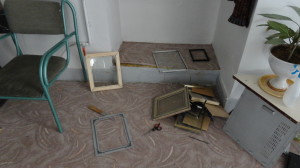November 15-2013

Government agents have raided the homes of 14 Baha’i families and told them to leave town or face the prospect of being attacked by angry residents, the Baha’i International Community charged Monday.
The 14 families live in Abadeh, near Shiraz in Fars province.
“The clear aim of the raids and questioning was to create an atmosphere of intimidation and fear, so that the Baha’is of Abadeh would be encouraged to leave the city,” said Diane Ala’i, a representative of the Baha’i International Community to the United Nations.
She said agents from the Shiraz office of the Ministry of Intelligence, with agents from Abadeh, launched the raids at about 8 a.m. October 13. The homes were searched, and Baha’i books, CDs, computers and other items, including photographs, were confiscated.
During questioning, several Baha’is were told that local residents “don’t like you” and that “when you are on the street, they might attack you and your children with knives.”
Ala’i, however, said that not only is there no evidence that the people of Abadeh themselves are against the Baha’is, but that the experience of the Baha’is says the opposite is true. Abadeh has a substantial Baha’i population.
“The real story is that the government is the culprit behind such threats and attacks,” she said. “The people of Abadeh have nothing against Baha’is and many love to associate with them freely.
Ala’i said, “In at least 52 cases since 2005 around the country, Iranian Baha’is have been physically assaulted—and these have almost always come after the clear instigation of plainclothes agents, the clergy, or the government-controlled media, which has waged a campaign to incite hatred against Baha’is.”
In the recent raids in Abadeh, she said, at least one resident from each home was summoned to the local office of the Ministry of Intelligence for questioning.
The agents urged the Baha’is to leave the city. “If you get attacked by people on the street, we cannot guarantee your safety,” one Baha’i was told.
Agents also closed down a shop that had been owned by a Baha’i, sealing its doors with an official notice that said: “This shop has been shut down by warrant of the public and revolutionary prosecutor of the city.”
“Regrettably,” said Ala’i, “the situation in Abadeh marks yet another incident showing that despite promises by Iran’s new president, Hassan Rohani, the situation for Baha’is has not improved. If anything, it has worsened.”
Ala’i noted, for example, that the government has taken no action to bring to justice the killers of Ataollah Rezvani, a Baha’i whose killing in August was believed religiously motivated. Nor, she said, have any of the more than 100 Baha’i prisoners been released.
The president, however, does not have any say over the Judiciary or the prosecutor’s offices. And the police and intelligence services are under the command of the Supreme Leader, not the president.
